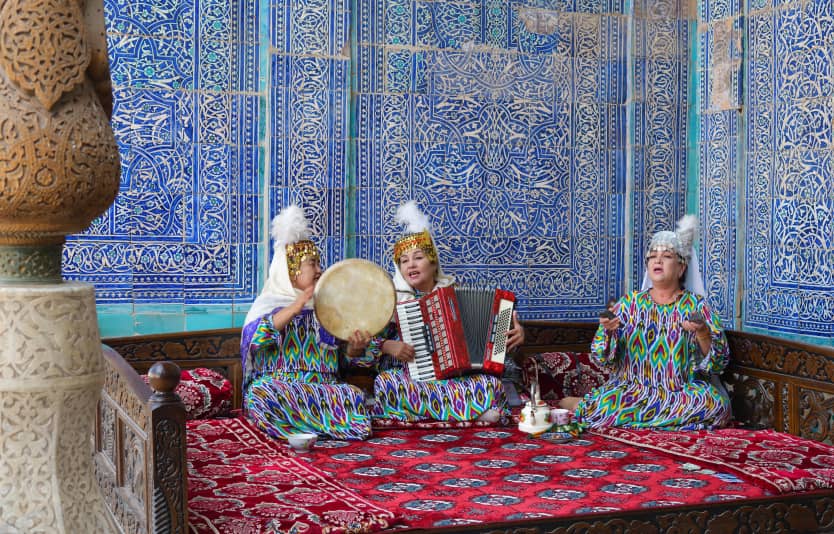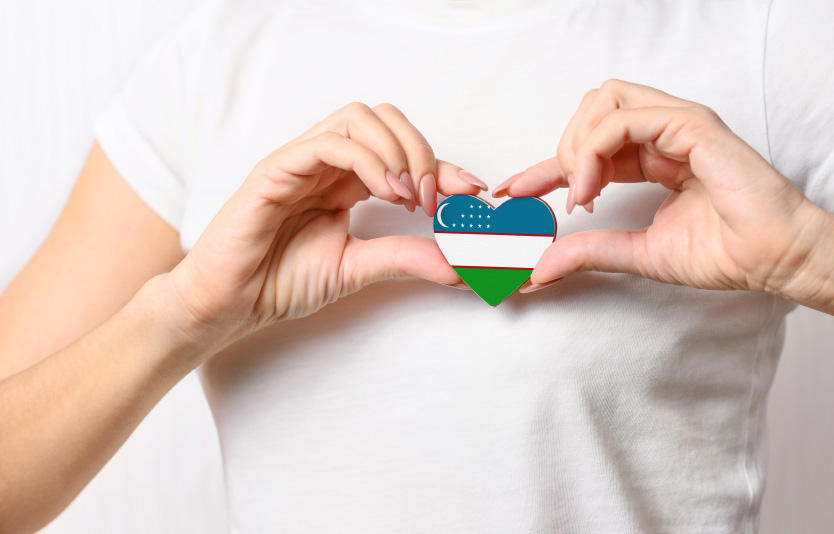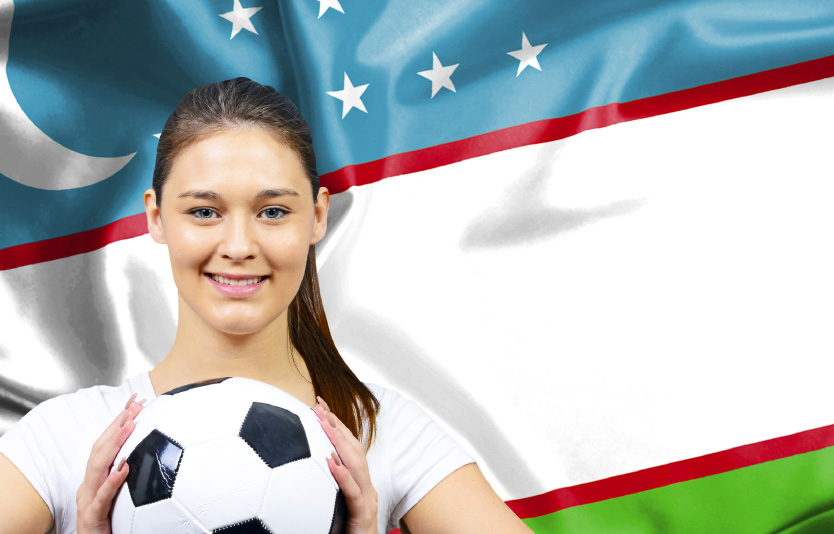Uzbekistan Women: Exploring Culture, Fashion, and Football in Central Asia
August 14, 2025
Uzbekistan women represent the vibrant heart of Central Asian culture, combining centuries-old traditions with modern achievements in sports, arts, and society. This remarkable population showcases incredible diversity through their cultural expressions, particularly in traditional crafts like the Uzbek atlas dress and contemporary pursuits such as football. Understanding Uzbek women provides deep insights into a society balancing heritage preservation with progressive development.
Located in the heart of Central Asia, Uzbekistan has a population of around 36–38 million people, with women representing roughly half of the population. These women maintain strong connections to traditional crafts, textile production, and family values while increasingly participating in education, sports, and professional careers.
From the intricate silk weaving techniques passed down through generations to the modern football fields where young athletes compete internationally, Uzbek women demonstrate remarkable adaptability and strength. Their stories reflect broader themes of cultural preservation, gender equality progress, and the dynamic nature of contemporary Central Asian society.

Uzbek atlas dress
Traditional Heritage and Cultural Identity
Uzbekistan women serve as the primary guardians of cultural traditions that have shaped Central Asian civilization for over a millennium. Their role in preserving traditional crafts, especially textile production, represents one of the most significant contributions to regional cultural heritage.
The textile tradition particularly showcases women's central role in Uzbek culture. Families pass down silk weaving techniques from grandmother to granddaughter, ensuring centuries-old methods survive in the modern era. These skills encompass not only technical weaving abilities but also the complex knowledge of natural dyes, pattern creation, and cultural symbolism embedded in each design.
Women in contemporary Uzbekistan face unique challenges while navigating between traditional expectations and modern opportunities. According to research, gender roles changed significantly during the Soviet period and continue evolving since independence. While progress has been made, persistent issues include labor market segregation and wage disparities.
Economic Participation and Challenges
The economic landscape for Uzbek women reflects both opportunities and limitations. Research indicates that women are concentrated in low-wage sectors and often receive lower wages than men for similar work. The labor market remains largely sex-segregated, with women comprising "virtually entirely" the unskilled personnel in non-production sectors.
However, recent legislative changes show positive developments. In 2023, the Uzbek government passed laws offering protections against harassment and abuse. Recent social policies in Uzbekistan have introduced certain benefits for mothers, including discussions around flexible retirement options, although exact age thresholds and eligibility criteria may vary.
Political Representation and Progress
Women's political participation in Uzbekistan has shown significant improvement in recent years. As of February 2024, women held 34.6% of seats in parliament, indicating substantial progress in political representation. This achievement reflects growing recognition of women's capabilities and contributions to national governance.
For travelers interested in experiencing this rich cultural heritage firsthand, proper documentation ensures smooth entry into Uzbekistan. Those seeking professional visa assistance for Central Asia travel can access comprehensive support for exploring this fascinating destination.

Women's political participation in Uzbekistan
Uzbek Atlas Dress: A Masterpiece of Traditional Textile Art
The Uzbek atlas dress represents one of Central Asia's most sophisticated traditional garments, combining centuries of textile expertise with contemporary fashion sensibilities. This magnificent creation showcases the pinnacle of Uzbek silk weaving traditions while serving as a symbol of cultural identity and artistic achievement.
Historical Significance and Royal Heritage
The name ‘khan-atlas’ (royal silk) reflects its luxurious quality and prestige, and legends suggest it was once reserved for the elite. While not all historians agree on this exclusivity, the fabric has long been associated with wealth and nobility. This exclusive heritage reflects the exceptional quality and craftsmanship required to create authentic atlas fabric. The iridescent silk has become an integral part of Uzbek cultural heritage that cannot be separated from national clothing traditions.
The production process demonstrates remarkable complexity and artistic skill. Traditional atlas production is a complex and time-intensive process, often involving dozens of stages and significant manual labor, though modern workshops may combine traditional methods with contemporary techniques. If a meter contains four paint types, the fabric undergoes four separate dyeing processes, each requiring manual winding and unwinding.
Traditional Production Methods
Uzbek atlas creation follows ancient technological methods preserved through generations. Master craftsmen grind patterns directly onto silk threads, with finer patterns requiring more sophisticated skills. Natural dyes create the distinctive colors using traditional materials including:
- Pomegranate peels for rich reds
- Madder root for deep crimson shades
- Various fruit and plant extracts
- Onion husks for golden tones
The most prized atlas fabrics achieve seven colors representing the complete rainbow spectrum. While modern production may feature three, four, or five colors depending on fashion trends, the traditional seven-color atlas remains the ultimate achievement.
Regional Variations and Specializations
Margilan in the Ferghana Region serves as the epicenter of Uzbek silk production through the famous Yodgorlik factory. This town has established itself as the premier center for highest-quality silk fabrics, where production reaches industrial scales while maintaining traditional hand-crafted elements.
Bukhara atlas and adras fabrics showcase distinctive regional characteristics with unique patterns and colors. These fabrics have earned recognition as UNESCO World Cultural Heritage, reflecting their global significance. Bukhara's atlas features the special "lyali-guli donachka" pattern traditionally used for women's shirts and blankets.
Contemporary Global Recognition
International fashion designers increasingly incorporate atlas motifs into their collections, bringing Central Asian aesthetics to global markets. Central Asian silk patterns have inspired international fashion designers, and atlas motifs have occasionally appeared in contemporary fashion collections showcased worldwide.
This international recognition has created new economic opportunities for Uzbek women involved in textile production. Traditional skills now serve both domestic cultural preservation and international commercial markets, providing sustainable livelihoods while maintaining cultural authenticity.
For visitors planning to experience this remarkable textile tradition during their travels, ensuring proper documentation facilitates smooth cultural exploration. Travelers can monitor their visa processing status while preparing for their Uzbek cultural journey.
Modern Atlas Dress Designs
Contemporary Uzbek atlas dresses blend traditional weaving techniques with modern fashion sensibilities. These garments feature:
Design Element | Traditional Approach | Modern Adaptation |
Silhouette | Flowing, modest coverage | Contemporary cuts, varied lengths |
Patterns | Ancient geometric motifs | Updated traditional designs |
Colors | Natural dye palettes | Expanded color ranges |
The versatility of atlas fabric allows for both formal ceremonial wear and casual everyday clothing. Modern Uzbek women proudly wear atlas dresses for celebrations, special events, and cultural festivals, maintaining connections to their heritage while embracing contemporary lifestyles.
Shopping and Cultural Experience
Traditional bazaars and modern shops throughout Uzbekistan offer extensive selections of atlas clothing and accessories. The historic "Trading domes" bazaar in Bukhara provides authentic shopping experiences where visitors can purchase high-quality atlas products directly from local artisans.
These markets offer comprehensive ranges including national clothing, accessories, modern clothing with atlas elements, household items, and decorative objects. Shopping for atlas products provides cultural immersion opportunities while supporting traditional crafts and local economies.

Uzbekistan Women Soccer
Uzbekistan Women Soccer: Rising Stars in International Competition
Uzbekistan women soccer has emerged as a significant force in Central Asian athletics, representing the country's growing commitment to women's sports development and international competition. The national team's achievements reflect broader social changes supporting women's participation in previously male-dominated fields.
National Team Achievements and Development
The Uzbekistan women's national football team has regularly taken part in Asian continental tournaments, with several appearances in qualification rounds and regional championships. A significant milestone occurred in 2018 when the team won the regional Central Asian Football Association women's championship, establishing Uzbekistan as a regional football power.
Historic hosting opportunity awaits Uzbekistan as the first Central Asian nation selected to host the AFC Women's Asian Cup in 2029. This prestigious tournament will showcase the country's football infrastructure development and commitment to women's sports on the continental stage.
Recent Performance and International Matches
The team's recent performance demonstrates steady improvement and competitive spirit. Notable recent results include:
Successful regional matches: In 2025, the team achieved impressive victories including a 10-0 triumph over Sri Lanka and a 7-0 victory against Laos in AFC Women's Asian Cup qualification matches. These dominant performances highlight the team's growing technical capabilities and tactical sophistication.
International friendly matches have provided valuable experience against diverse opponents. The team faced challenging fixtures against established football nations including France, China, and South Korea, gaining crucial experience while building international recognition.
Youth Development and Future Prospects
Groundbreaking youth initiatives mark significant progress in women's football development. For the first time in Uzbekistan's history, the country introduced a national football championship for girls under 12 years old. This tournament operates under FIFA's League Development Programme and represents a crucial milestone in developing women's football nationwide.
The championship's primary objectives include:
- Building foundational football skills from early ages
- Creating structured development pathways
- Increasing female participation in organized sports
- Establishing long-term talent identification systems
Under-20 and Under-17 programs continue expanding to create comprehensive development structures. These age-group teams participate in regional and continental competitions, providing international experience and professional development opportunities for young female athletes.
For travelers interested in experiencing Uzbekistan's sports culture and women's achievements, professional visa services ensure smooth travel arrangements. Those researching visa service pricing and options can access comprehensive support for their Central Asian sports tourism plans.
Professional League Development
The Uzbekistan Women's League serves as the top division of women's football domestically, providing competitive structures for female athletes throughout the country. This league creates professional pathways while maintaining connections to grassroots development programs.
The league structure supports both established players and emerging talent, creating mentorship opportunities and competitive environments that elevate overall playing standards. Regular domestic competition prepares players for international representation while building sustainable football culture.
Infrastructure and Support Systems
Modern training facilities and professional coaching staff support the women's national team development. The team utilizes venues including Milliy Stadium in Tashkent for major international matches, providing world-class playing conditions.
Social media presence through platforms like Instagram (@ufawf) helps promote women's football and build fan engagement. This digital outreach increases visibility for female athletes while inspiring young girls to pursue football careers.
Challenges and Opportunities
Women's football in Uzbekistan faces typical development challenges including funding limitations, infrastructure needs, and cultural adaptation. However, government support, international recognition, and growing public interest create positive momentum for continued growth.
The 2029 AFC Women's Asian Cup hosting opportunity will likely accelerate infrastructure development, international exposure, and domestic interest in women's football. This tournament could serve as a catalyst for long-term program expansion and regional leadership development.
Contemporary Social Progress and Cultural Evolution
Modern Uzbek women navigate complex social landscapes while contributing to their country's development across multiple sectors. Their experiences reflect broader regional trends toward gender equality, educational advancement, and professional participation while honoring traditional cultural values.
Education and Professional Development
Educational achievements among Uzbek women have expanded significantly, with increasing participation in higher education and technical training programs. This educational progress creates foundations for professional advancement and economic participation across diverse sectors.
Language skills particularly benefit Uzbek women in international contexts. Many educated women speak multiple languages including Uzbek, Russian, Tajik, and increasingly English, facilitating participation in global markets and cultural exchanges.
Cultural Preservation and Innovation
Uzbek women continue serving as primary custodians of cultural traditions while adapting these practices to contemporary contexts. This balance allows cultural continuity while embracing beneficial changes that improve quality of life and economic opportunities.
Traditional craft industries provide both cultural preservation and economic benefits. Women's expertise in textile production, ceramic arts, and traditional cooking creates tourism opportunities while maintaining authentic cultural expressions.
Social Challenges and Progress
Research indicates that social problems persist, including domestic violence and economic discrimination. However, recent legislative improvements and growing awareness create frameworks for addressing these challenges systematically.
International recognition of women's rights issues has encouraged government policy changes and social programs aimed at improving women's status and opportunities throughout Uzbek society.
Frequently Asked Questions
What makes the Uzbek atlas dress special compared to other traditional garments?
The Uzbek atlas dress features khan-atlas fabric created through 22 technological operations requiring 2.5 months and 70% manual labor for each meter. This "royal silk" originally was exclusive to khan families and uses natural dyes including pomegranate peels and madder root. The iridescent quality and traditional seven-color rainbow patterns make it unique among Central Asian textiles.
How successful is the Uzbekistan women's soccer team internationally?
The Uzbekistan women's national football team has achieved significant regional success, winning the Central Asian Football Association women's championship in 2018. Recent performances include dominant victories like 10-0 over Sri Lanka and 7-0 against Laos in 2025 AFC qualification matches. Uzbekistan will become the first Central Asian nation to host the AFC Women's Asian Cup in 2029.
What opportunities do modern Uzbek women have in contemporary society?
Modern Uzbek women increasingly participate in higher education, professional careers, and political representation, with women holding 34.6% of parliamentary seats as of 2024. However, challenges remain including labor market segregation and wage disparities. Recent improvements include 2023 laws protecting against harassment and early retirement options for mothers with disabled or multiple children.
Uzbekistan women embody the remarkable synthesis of ancient cultural wisdom and contemporary aspirations that defines modern Central Asia. From the intricate artistry of traditional Uzbek atlas dress production to the dynamic achievements of national soccer teams, these women demonstrate exceptional versatility and cultural depth that enriches both their society and the broader region.
The preservation of textile traditions like khan-atlas weaving showcases how Uzbek women maintain vital cultural connections while adapting to global markets and contemporary opportunities. Their mastery of complex production techniques, combined with international fashion recognition, creates sustainable economic opportunities that honor heritage while embracing innovation.
Similarly, the rapid development of women's soccer reflects broader social progress and the growing recognition of female athletic achievement. The upcoming 2029 AFC Women's Asian Cup hosting opportunity represents not just sporting success but also Uzbekistan's commitment to gender equality and international engagement.
For travelers seeking authentic cultural experiences and opportunities to witness this remarkable cultural evolution, Uzbekistan offers unparalleled insights into how traditional societies successfully navigate modernization while preserving essential cultural elements. The warmth of Uzbek hospitality, combined with rich textile traditions and exciting sports developments, creates comprehensive cultural experiences.
Planning your journey to experience the remarkable achievements and cultural richness of Uzbekistan requires proper travel documentation for international visitors. GVC provides professional visa services specifically designed to help travelers navigate entry requirements efficiently while planning comprehensive cultural tours. Their experienced team offers complete support throughout the application process, ensuring your focus remains on preparing for incredible encounters with Uzbek culture, traditional crafts, and sporting achievements rather than administrative complications. With reliable service and expert guidance, your opportunity to experience the diversity and accomplishments of Uzbek women becomes a seamless and enriching reality.
Related Articles:
Tags




